#some would argue that it is a kind of poetry in itself
Explore tagged Tumblr posts
Photo

You can make all sorts of solid arguments against a constitutional monarchy - but the point of monarchy is precisely that it is not the fruit of an argument. It is emphatically not an Enlightenment institution. It’s a primordial institution smuggled into a democratic system. It has nothing to do with merit and logic and everything to do with authority and mystery - two deeply human needs our modern world has trouble satisfying without danger.
- Andrew Sullivan
This is the genius of the British monarchy, supremacy exemplified in the late Queen Elizabeth II and now in King Charles III. Walter Bagehot was the first to really get to the heart of the matter.
Walter Bagehot, a journalist who would co-found and edit The Economist magazine was one of the greatest Victorians of the 19th century and he concerned himself with the workings and the reform of the delicate constitutional arrangements between parliament, the House of Lords, and the monarchy as so much is based on custom and unwritten practice.
Walter Bagehot published his classic work, The English Constitution in 1867 but it is the best way to understand the delicate balance of parliament and the monarchy. No one has written a finer work than Bagehot and his book remains the bible for many interested in constitutional matters regarding the monarchy.
In it he argued that the constitution was divided into two branches. The monarchy represents the “dignified” branch. Its job is to symbolise the nation through pomp and ceremony. The government - Parliament, the cabinet and the civil service - represents the “efficient” branch. Its job is to run the country by passing laws and providing public services. He was right to say that the dignified branch governs through poetry, and the efficient branch through prose.
In Bagehot’s view, a politically-inactive monarchy served the best interests of the United Kingdom; by abstaining from direct rule, the monarch levitated above the political fray of tribal politics (of left and right), and remained a respected personage to whom all subjects could look to as a guiding light. The monarch was to stay severely neutral and be apolitical. Instead the monarch was to embody in the flesh the core values of a nation.
There is a tremendous burden tied to that kind of role. When Elizabeth Windsor became queen, she was tasked as a twenty-something with a job that required her to say or do nothing that could be misconstrued, controversial, or even interestingly human - for the rest of her life. She achieved that both stoically and heroically in many people’s eyes. King Charles III has taken on that inhuman mantle now. Time will tell if he can follow the late Queen’s example.
Duty, sacrificial service, and honour....without power. That’s the role of modern royalty.
It’s hard for non-British people to understand how a monarch can come to embody the psyche of the nation. The Crown represents something from the ancient past, a logically indefensible but emotionally salient symbol of something called a nation, something that gives its members meaning and happiness. As Bagehot says, it’s an act of imagination.
Some of my non-British friends particularly can’t quite grasp this connection; to them the British royal family functions mainly at best as a different form of celebrity. But to these friends as well as those republican friends sincerely opposed to monarchy can and should grasp something else - nations and cultures need people and institutions who transcend politics, which left to itself quickly descends into tribalism or worse, authoritarianism.
#sullivan#andrew sullivan#quote#monarchy#british monarchy#king charles III#united kingdom#crown#royalty#constitutional monarchy#history#custom#heritage#tradition#queen elizabeth II#bagehot#walter bagehot#society#politics
108 notes
·
View notes
Text
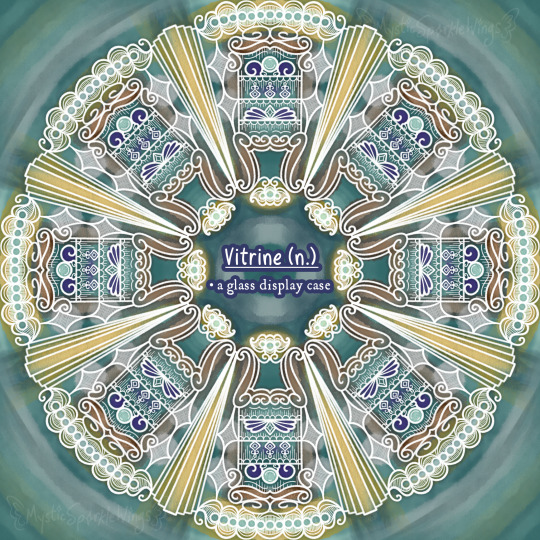
Obscutober 2024 Day 30: Vitrine 💎
----------
Vitrine (n.)
a glass display case
----------
I may have still be short on ideas for this one, but I think I was mentally prepared for it a bit more, which helped considerably. 🙌
My best? No, but I do like it! Let’s just hope I can say at least that much tomorrow…😅 So close to the end!!
Click the "Keep Reading" and we'll talk a bit more about my general thoughts/process. ✨
Like My Art and Want to see more of it? Here's All My Links! ⭐️
----------
I admittedly yet again did not have a ton of ideas for this one, and it probably shows. 😅 However, I do think I managed a little bit better because I actually remembered this one was on the list for most of the month, so it's been kind of living in my subconscious all the while. I think that shows, too.
This was though a word I originally put on the list because of the fun I thought it would be if I'd chosen to work with the mini-magnets. Yes, a glass display case itself is a very specific thing, but the cases can be designed in a few different ways, serve different purposes, and hold a multitude of different things. I had it in mind that toying with the different expectations and contents of a glass display would lend themselves well to poetry.
...But I'm not working with poetry here, am I? 🙃
At least not literally; If you want to argue figuratively, I won't stop you.
Still, in another timeline where I had more than just a single day—probably more like a whole month to itself—to play around with the concept, and maybe if I had decided to work on a bigger canvas, I might have ended up with an outcome more like some of the designs you see in Adult Coloring books. I'm thinking along the lines of Johanna Basford's work, but she's just the one I know best by name, plenty of others I think could also do wonders with, "A glass display case full of interesting stuff."
I did try to capture a little of that general idea, still, but some of Sparklers are probably familiar enough with what I usually have to say about these mandalas by now that you might guess: I wanted to lean more in the "traditional mandala" direction. Both just for the aesthetic-y reasons, but yeah I will be frank that that way, particularly with this kind of subject, was much faster, too.
Speaking of, I would also like it on the record that I initially didn't back myself into quite as tight of time-crunch corner tonight...But I neglected to notice my Apple Pencil needed charging before I got started, so at one point I had to both break for dinner and just to let the pencil charge, and that basically ate up whatever tiny bit of "extra" time I had when I got started. 🫠
Anyway. I started with a vaguely French/Rocco Vitrine-inspired shape as my base, then "decorated" it a little, and tried to"fill" it with a few things—A crystal ball, something that lightly resembles perfum bottles, and a gem. Then I went around filling space with a little Art Nouveu and little Art Deco, kind of thinking of a jewelry store that's maybe been around for years and years, that would have a bunch of antique-y display cases hanging around instead of the sleek, boxy modern kind.
So not the most elaborate design in the world, but I do think this is one of my better attempts to marry the more doodle-y nature a lot of these have come out with and some more typical mandala motifs and ideas. It's still certainly not perfect in that regard, but I do think it kind of stands out in a good way because of that.
This is thought probably another where the colors are doing a lot of work to help things along. 😅
White lines were a must. They felt kind of essential to the "glass" feel, much like back on Day 21. And now is a good time to note that I also fought with myself quite a bit on the colors to keep the two of them—today and Day 21—from feeling too similar to each other. This was mainly accomplished by sticking with teals and avoiding "true" blues. Which, I do think that made for a nice nod to how a lot of glass has kind of an underlying green tint to it.
I still can't say I necessarily avoided them looking similar as much as I would've liked, all the things considered, but the clock was ticking, so it is what it is. 🤷♀️
...And I think that's kind of everything I have to say, really. Probably for the best since typing this out took longer than I expected and I still have to get to cross-posting, but I do feel a little bad that I managed to enjoy this one more than the last few and feel like I have even less to say about it. 🫤
Oh well. At least I am happy with it. I hope I can say at least that much tomorrow...And naturally, I really hope I can get tomorrow's posted earlier so I can be DONE and work on some other things, but after the way last week and this week is going so far...I have my doubts.
Even so, wish me luck either way, Sparklers—We're so close to the end!! 😵💫
----------
See the Prompt List
Artwork © me, MysticSparklewings
Obscutober Concept Inspired by nikolas_tower
----------
⭐️ Like My Art and Want to see more of it? Here's All My Links! ⭐️
#inktober#mysticsparklewings#xxmysticwingsxx#drawtober#illustration#procreate#digital art#obscure words#rare words#obsuctober#obscutober2024#mysticsobscutober#glass#glass case#display#case#on display#jewels#jewelry#mandala art#inktober2024
4 notes
·
View notes
Note
Do u believe that Jaime might kill Cersei and then himself at the end of the series? I saw other page theorizing about him killing himself as a final act or something like that…
i think about jaime and suicide a lot bc i do think it is a permeating theme with him in many ways, and he does do a lot of passive suicidal ideation. he is one of the characters who does not fear death really and is reckless in a way that it is clear that part of him seems drawn to it because of his existential dread. idk bc the thing is that i do think that “what else can i do, but die?” passage indicates the opposite of an ending with suicide specifically, and i think there are themes relevant to him here that i think are more likely to be followed through rather than be tragically rejected:
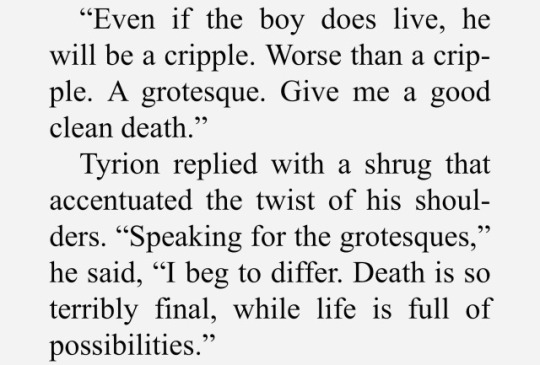

nonetheless, theres a certain part of me that is morbidly drawn to him succumbing to despair anyway. like if he dies with valonqar, i think thats the only way i would actually like it. i was never someone that felt particularly moved by the “poetry” or “irony” of dying together because i always thought all of that is much richer if it is treated as desperate self affirming delusion that is bound to collapse. and we already see jaime reject dying with her once. there is a visible degree of acceptance of their fates not being entwined that is not feigned bc he did actually leave her to her fate and no longer feels the obligation to die with her, pretty clearly juxtaposed with his mindset in asos where he revolves his life around her “needing” him, and ofc cersei’s own desperate narrative rn. and i think george writing it so they can die exactly at the same time doesnt just feel unrealistic but also would hurt the weight of the scene to me because it would give me no aftermath. a wall falls on them both? valonqar doesnt even happen then. jaime killing cersei and then a wall falls on him or some shit? whats the point? double suicide? where is the ‘betrayal’ and irony and subversion of the jc dynamic’s narrative? cersei’s mindset is proven right. cersei kills him? idk if that works with cersei’s tragedy/betrayal/shock + how would she? he’s injured from something else and makes sure to bring down cersei with him? ig, still feel eh about it. if it happens, i wouldnt feel that much about anything thats not an actual suicide after a murder. and even then, it would make more sense for jaime to attempt suicide by rushing into the nearest battle/suicide mission based on his established characterization. that is the type of act that would be in character rather than just falling on a sword then and there ig. u can argue that the choice itself of him going back can be framed as a suicide attempt where he wants to go down with a sinking ship bc he thinks thats what he deserves, and ofc depending on when this happens the city might be beyond saving already, but still, the execution and circumstances matter to me. i also obviously dont want it framed as him being unable to live without cersei. i find that reductive of his character and boring on top of kind of incongruent bc he already made that choice of key separation once. he already proved himself capable of treating their lives as not entwined. i would only like suicide if it was about a complicated and ingrained sense of failure over not being able to triumph over reckoning with the world and the self (this is what makes the light go out in the weirwood dream too. cersei leaving is not where it ends), esp bc i assume the whole thing is playing on history repeating itself in the most ironic and dark way imaginable. ofc a bigger part of me wants triumph over that this time and for that flaming sword that he gave brienne to still burn and provide light in “his darkness”, replacing cersei’s torch that she takes with her in the dream as she joins tywin and joffrey and the lannister ancestors and leaves jaime in “the dark”, to represent some deeper purpose also embodied by brienne that allows him to continue past this point (the flames will burn as long as you live when they die so must you), and i also think it works better in a lot of ways. i have talked about widow’s wail currently being in the red keep, the twin swords set up, twftd foreshadowing, how i interpret the prophecies in the weirwood dream and how it works with the past and future etc, even how it all comes together thematically when it concerns knighthood and the cynicism/idealism synthesis. but still, a part of me is attracted to that kind of painful tragedy. im fairly open to a lot of things in general if they are not halfbaked and incongruent and dont make me feel empty in a bad way on top of being unsatisfied. but yeah, when thinking about the narrative as a whole, idk how it could work in a way that id like based on all that i have read.
to me, theres too much cost in terms of set ups, unless it happens at the very end of the story ig. but how would that work logistically? and when and how would he acquire widow’s wail? that sword’s a chekhovs gun for twftd that i think jaime has the most foreshadowing and set up with. what else would he do at the red keep? why put him there again when this part of the story could be wrapped up? like theres a certain order of events that seems to work and make the established pieces fall together much better in my head, but ofc i could be wrong.
25 notes
·
View notes
Note
hello! I read you're "predominantly a Romanist" so I'm not really sure if you can help me but I have this question bugging me for weeks and I thought some clarity from people more expert than me could probably be insightful, so here's the tea: many generations of Italian high schoolers have been taught that Sappho was the headmaster of some sort of college (the term used in lit history books is "thiasus", but I'm 99% sure this is some wild anachronism, and that if such institution even existed it was certainly not called that); according to Ye Olde Books, this thiasus was some sort of bon ton academy to prep young girls for womanhood and marriage, and Sappho's homoerotic poetry must be therefore viewed through this "socratic" lens. Herein lies the issue, that while there seems to be no ancient evidence to prove or disprove this fact, every Italian schoolbook I've stumbled upon either in high school or university never provided a source for this (they all mention the Souda which is problematic in itself, but even there it's only said that her pupils were so and so and so, not that she was actually the head of any formal institution). Plus, looking over on wikipedia, the Italian one takes the thiasus claim at face value without even giving a source (again), while the English wikipedia goes at a length to explain that this idea has no historical grounds and it's just a xix century suggestion. I've even stumbled upon this Maximus Tyrius rhetorician from the second century and he quotes Sappho's views on love and the women she loved, without explicitly saying they were her pupils or part of an academic circle.
So, here's my question: is this concept actually still taught in the Anglo world, and is there any substantial evidence for it? Is it just a weird little straightwashing lie that is still taught in my home country to try and justify any homoerotic reading of the Lesbian, or is there possibly any truth in it?
Sorry for the long ask but I'm going kinda insane here, and i thought one thing i could do is hear from some non Italians cause it's clear to me that all Italian texts are more or less a copypaste of each other on this subject; if you could please tell me anything about this I'd be so thankful, thanks a lot xoxo
Hello! It's been a minute since I've been seriously engaged with Sappho scholarship, but this is something I am familiar with.
The short answer is, no, as far as I know there is no real ancient evidence for it and the concept has generally been regarded as debunked in English-language scholarship since the 90s. The oldest source we have for the concept is the 10th c. CE Souda, which (as you mention) is deeply problematic for a variety of reasons, and it seems probable that the idea of Sappho's thiasos originates with one of the many Greek comedies about Sappho (Sappho was something of a stock character in Greek comedy, with the joke typically being her excessive (hetero-)sexuality rather than homosexuality). The idea seems to have been picked up by 19th century German scholars, and the argument for it relies on the testimony in the Souda along with apparent parallels between Sappho's expression of homoerotic desire and the homoerotic language between women and girls in Alcman's parthenaia, which do have a context of chorus trainer/trainee relationships. However, there is probably no good reason to assume that Alcman/Sappho parallels make for a strong argument considering that the texts come from entirely different city-states and social contexts. I do know that Renate Schlesier has argued for a much less heteronormative and IMO more plausible version of the thiasos idea, which is essentially that the circle of women mentioned in Sappho's poetry is not any kind of "academy to prepare (aristocratic) young women for marriage" but a circle of enslaved sex workers/courtesans (hetairai). Schlesier cites the fact that the female personal names mentioned in Sappho's poetry are all names that would typically be associated with enslaved women and hetairai, at least prior to the Hellenistic period, and considering that the symposium was probably the main venue for the performance of erotic lyric in antiquity this seems to make a good deal of sense.
I won't recommend the article that essentially debunked the thiasos idea on account of its author being a truly awful person for unrelated reasons, but I would recommend this excellent Eidolon piece on "Re-Queering Sappho" as well as Melissa Mueller's 2021 chapter "Sappho and Sexuality" in The Cambridge Companion to Sappho (link here, but probably requires a library subscription) which covers the history of the idea very well and presents a compelling reworking of the idea of Sappho's circle in a way that embraces rather than resists the queerness of Sappho's poetry.
8 notes
·
View notes
Text
The Rites dedicated to Helen at Sparta
So I've been re-watching a section of the Bettany Hughes documentary about Helen of Sparta (here), and I just have thoughts that I have to let out, for the purposes of getting my own ideas in order.
I'm preparing to write a scene based on these rites, so they're uppermost in my mind right now.
This is my own transcription of what Hughes says in the documentary:
The Greeks told stories of how Helen would come to the banks of the Eurotas to dance all night with other young girls. Centuries later these dances were re-staged in some kind of attempt to capture the spirit of Helen. And we still have fragments of the poetry the girls sang together*. These rites are vital to understanding Helen's appeal. The gift she is giving the girls isn't beauty but what the Greeks call kharis[...] the root of our word charisma, and it can simply mean grace. But it also has an erotic connotation. By invoking the spirit of Helen, the young girls are learning to become charismatic, sexually aware, and certainly these rituals would have been highly charged affairs. They were [there] alone together all night, there was drinking, and torchlight, and they danced naked until dawn.
(* The maiden-song is at 31:15. As no source is provided in the documentary, I have yet to find the source itself. I will update this post should I find it. Another maiden-song can be read here, though.)
Point by point then:
I truly don't know why anyone would argue that beauty wasn't at least amongst the gifts the girls went to Helen for during these rites, even if that isn't mentioned explicitly in the few fragments of poetry we have to go on. To my knowledge, it's the only attested reason to worship her [Herodotus, Bk. 6.61.], so it's illogical to discount it.
To be clear, I don't speak Greek, modern or ancient, but everywhere I've looked, kharis is defined as grace predominantly, just as Hughes says, but wikipedia did give me the additional words beauty, elegance, and charm. The only place I could find reference to anything hinting at an overtly sexual definition (if you squint and look at 'attraction' with the eye of faith) was at the website Baring the Aegis, which is a website dedicated to modern Hellenic Polytheism.
There, it's said:
Kharis is an important word. It means everything from beauty to joy, delight, kindness, good will, grace, favor, benefit, boon, charm, attraction, appeal, elegance, gracefulness, pleasure, cheerfulness, wit, gratitude, thankfulness and gratification. It's the name of a Goddess as well; the Goddess of Grace and Beauty.
It feels like a stretch to imply that there's anything sexual about the gift of kharis in the specific setting of a group of young girls dancing together, even if there is an erotic undertone to that word in some instances... Unless, that is, we look at it the details of the rite as Hughes presents them purely through a modern western lens.
Suggesting that a group of young girls being naked together is inherently sexual is so western it slaps you in the face. It's quite obvious from our sources that nudity was acceptable at Sparta in a way that many modern scholars seem to find it very difficult to accept. I addressed this a little here, but in brief, for example - we're told that young girls exercised naked together - though scholars argue over it, the texts don't leave that open to interpretation - they use the same word for the girls' exercise as they do for the boys, literally, exercise in the nude. Girls are also said to have marched naked in public parades where the boys were present.
There's as good a grounds to suggest that everyone might have been naked in public fairly regularly, at least during the hotter months, as there is to suggest that your average Spartan would've found nudity inherently sexual, weird, uncomfortable, or especially gendered.
I don't for a second believe these girls would've been alone and unsupervised, when Sparta was to its core a surveillance state. No one went anywhere without being watched over - especially during the classical period when there was the ever-present danger of helot uprisings. They were hardly likely to allow a group of young girls into the night without any guardians going with them. If nothing else, surely there would've been priestesses/female elders to guide the girls on what was required to ensure the rites were executed correctly and to the satisfaction of the gods/Helen herself.
Further to that - the idea that drinking wine implies 'something sexual is bound to happen' is also misguided, in my opinion. It's incredibly unlikely that the girls would've been drinking enough to get drunk, when even Spartan men were debarred from drinking to excess. Even if we assume they hadn't drunk wine before, which may or may not have been true, they aren't going to be falling down in a wine induced orgy after a shared kylix.
And torchlight being sexy? That's like saying when we flick on the light switch in modern times, sex must be on the cards. It was literally just their lighting.
So yeah. I just think this is one of those examples of a scenario that should be labelled fantasy rather than fact and perhaps not be inserted into a documentary without more preamble. Of course my version is much less exciting - but unfortunately, reality (at least as much as we can reconstruct it now) tends to be like that when you go looking for it, especially where Sparta is concerned.
[Also, I am once again putting this into the cosmos: documentary makers should be required to site their sources. If a YouTube essayist can do it, so can they.]
#history#sparta#spartan history#ancient sparta#spartan women#bettany hughes#The Ancient World Helen of Troy#youtube#helen of sparta#helen of troy
2 notes
·
View notes
Text
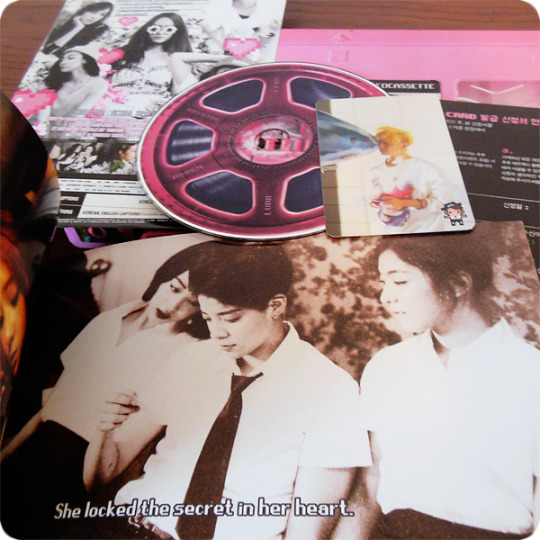
10th Anniversary
f(x): Pink Tape (2013.07.29)
Pink Tape is a gold standard of an album, not just for K-pop, but for pop music in general. It has been named the Greatest K-pop Album of the 2010s by Billboard in 2019, and its lead single "Cheot Sarangni (Rum Pum Pum Pum)" was ranked #59 on its general "100 Greatest Girl Group Songs of All Time" list in 2017. Pink Tape is the type of album that other pop stars are still trying to emulate years after its release, and is the source of my oft-repeated refrain that "f(x) did it first” (see also, Red Light and 4 Walls).
The album was released exactly ten years ago in the summer of 2013, when the K-pop girl group was at is peak, and when, I would argue, K-pop itself had reached the very edge of its Golden Age plateau from which it would begin a kind of wandering, sporadic descent. Almost every single song on here sounds as fresh and exciting as it did ten years ago. Like much of their previous work, the album is full of quirky upbeat, pop songs that incorporate everything from dance, to disco, to rap, to hip-hop, to electro, to an almost avant-garde selection of instruments against the synthetic keyboards that comprise the bulk of the album's sound. The album does have one or two places where it falters a bit, in the obligatory ballad selections, which sound like any SM group could have done competently, like "Goodbye Summer" (co-written by member Amber) or "Yeou Gateun Nae Chingu (No More)" which sounds like something picked up from the cutting room floor of Girls’ Generation’s SNSD's Oh! album. But there are so many songs on here that only f(x) could pull off, like "Pretty Girl" and "Kick." The album is just sublime, and even songs that I don't particularly find myself returning to, I can appreciate. It's the type of song selection that works best as an entire album, illuminating the group's eclectic make up, both physically and musically, in their innovative, ground-breaking sound.
The packaging on this is super fun: it comes in a box that's shaped and designed to look like a pink, oversized VHS tape. The box opens up to reveal a type of OBI that wraps around the back and spine of the box, a booklet of the same height and size as the box, and the CD, along with one of a set of collectible photo cards, and some promo material. The pictures in the booklet are designed to look like stills from a "romantic, cult" teen flick, including "subtitled" captions on many of them that read more like random poetry than a cohesive narrative. It all adds to the fun and mystique of this album -- and I think it's clever and weirdly accurate to use the term "cult" to describe this album and group, as even though f(x) was mega-popular, they were still the somewhat quirkier, alternative sister-group to SM Entertainment's flagship girl-group Girls’ Generation (SNSD).
Catalog Number: SMK0272
13 notes
·
View notes
Note
i finished act 2!!!!!!!!!!!!!!!!!!!!!!!!!!!! now there's just all these events I've yet to get to from a3en... plus reading through act 3 translations if those exist... i hope they do! but the FIRST thing I'm going to do is fill out my a3! name chart, haha :) okay but before i get ahead of myself: here's my thoughts on the rest of the winter story!
the moment they mentioned the fleur award, I knew within my heart that act 3 might have the members seriously tackle winning or at least getting a nomination, and hey, look, sakuya mentioned it at the end! there's lots of little things I could feel them start to set up, which is cool. like, haruto mentions that godza has new recruits! so I assume shift is gonna pop up in act 3. and then there's the hyakka theater company which sakuya adored so much winning the fleur award at the end... I wonder if we'll get to meet them? I also saw a character on a poll tournament once that I think was an old leader of spring? and since yuzo's already someone we've met, I wonder if we'll meet all the leaders of the old troupes... we've already seen quite a few bits and pieces of them, after all! then, of course, there's the thing with misumi's grandfather's old scripts and reni, which I'm sure will come into play... hopefully we'll get to see his brother, too... guy also recognized reni, so he's probably got some kind of connections with mankai, right? what if he was a leader of the winter troupe, or something? lots of possibilities. and tsuzuru's eldest brother could also bring something interesting to the table? he got his own sprite and all, and he seems pretty interesting, so I feel it'd be a waste if this was his only appearance...
since we're on that subject, I was very glad to meet tadoru. his and itaru's conversation was just really nice, and it was cool to see him kinda watching out for tsuzuru in his awkward way. for a moment i was confused by him randomly saying hello to itaru at the bar, though. was sitting there like. ...is itaru getting hit on? tadoru also gave me sort of chikage-esque vibes because he was just that friendly, and so when he gave itaru sake and was like. hey! bribe material! i was like. ah. nice. would love to see some more elaboration on what he says, though because... “I mean, back when everything was falling apart at home, I just ran off and left Tsuzuru to deal with it all himself.” is intriguing. tadoru says that tsuzuru probably resents him... i mean, he definitely has a right to, but i don't think he like, does, if that makes sense? like... his family is his family. he might not have been happy about dealing with stuff without his eldest brother around, but I don't think it's something that would... fester, if it makes sense?
I've gotten ahead of myself again, so let's rewind chronologically... it was nice to see the improv battle spark something in guy! also it's nice every time they run into haruto because like, tasuku probably calls him "yamada" on purpose but like, half of the time that people get his name wrong, I'm pretty sure it's totally sincere, which makes it even funnier... like homare being like. "ah, hato-kun, I think it was?" with no ill-will is amazing. i didn't actually make the connection that this was tasuku's second time playing raoul until now, which is quite a fun detail.
don't have much to say about the play itself... you made a really good point about how POTO relates to guy, so I don't have much to add except that there's a comment that izumi makes about homare as richard dragging emotion out of the phantom, and I thought that was neat, because it's homare that gets guy to laugh, too, with his silly chickpeas bit. all of winter getting drunk was sooooo cute. its so dear to me that tasuku and tsumugi are just like. intelligently critiquing theatre stuff. not even arguing. like how is their drunk habit just... how they are normally, it's great. and then of course there's homare who's in tears and super sappily composing poetry. love him. and love that he manages to elicit a truly wonderful-sounding laugh from guy the same way, later! what a BEAUTIFUL cg that was!!! homare looks so pleased with himself and he's right to be that way!!
the power outage for the last performance was such a cool moment, too... like, the way that this phantom's final line dedicates his song for his friend. where it's not about being a singer or taking his revenge, anymore. it's such a good way to reflect what guy says before the final performance, that being "all of you are the reason I am able to see myself as human again.” which is what chris does for the phantom, here. you can also hear in guy's BREATH how much finishing this play affected him, which is awesome. seriously, the VAs are so talented, but also whoever's directing them or the like has a really good eye for what kinds of voice performances to add...
watched the backstages and them at karaoke was cute! so they staged it with just music, i see... the part where they method acted like they were in a musical was really funny. yuki resorting to just saying he'll make them pay him every time they break out into song... the sakyo-influence. tsuzuru and yuki would actually be a really fun combo in terms of like, events, also. they've both got this midlly pessimistic way of talking. the SR hisoka was also really good... cant believe he sleeps in a coffin! no wonder tasuku got so into treating hisoka as a vampire during nocturnality lol. anyways what a great actor he is. i love that, with the possibility that hisoka was possessed presented to tasuku, who's seen magic happen before, tasuku is like. alright. time to act my heart out. i bet it was really good practice.
there's a bit where sakuya says "citron was still with us back then..." which. very misleading turn of phrase. anyways they're going to zafra!! whoo!! i think it's so funny that guy is like "I'm a wanted criminal" as like an expression of the fact that his presence is troublesome, completely unaware of the fact that two of the people he's gonna be travelling with are like, also wanted criminals. itaru has every right to call chikage a "menace" like he does here.
another hit out of the park with izumi going "I do not see." about chikage's illegal passport for guy. the structure of this episode is really interesting, though--winter had really big developments outside of their own story (tsumugi in act 1 plus a bit of tasuku, homare in the next play, azuma in the next + a bit of tasuku there, too, and then hisoka in spring's act 2 story. because they got such rich development there, it gives the story space to really work out things between guy and citron. like, apart from azuma and tasuku visiting azuma's old home, it's not like there's a particularly big event any of the other winter members go through? while spring has masumi's whole deal and though its minor, itaru has to open up a little to having a roommate. and summer had tenma's audition and dealing with that stuff, plus kazunari's career worries, alongside kumon's whole stresses (of which muku and juza obviously were major in helping him with). everyone in autumn gets a collage, but while it's not like the characters in winter weren't major presences, it was more like they were reflecting on stuff that had already happened, rather than having new things that developed them in some way? which allows for space.
as for guy's subordinate, mika, i'm like 80% sure their name is mika because it's meant to be like, "mikan"
we already discussed my opinion of zafra as a nation so there's no need for me to really go into that, but about tangerine!! firstly the fact that tsuzuru just has to instinctually correct his japanese is so dear to me, like, he can't rid himself of the impulse... also I can't believe I said muku probably reminded citron of tangerine and guy basically echoes my exact thoughts... like muku, he's rather cute and brave! running to save citron, and then making sure the fire is taken care of... what a good person! I'm sure he'll do well... didn't end up being twist-evil after all, phew. I'm glad I was wrong about that. the end was a little underwhelming in terms of how the king wrapped it up. i'm glad he did so kindly, but I think it's a rather big upheaval that just happened and it felt like things got wrapped up quite neatly... I feel like there's probably a more complicated and interesting way it could've gone down, that also makes zafra feel more like a real place, but that's for me to obsessively plot and headcanon my way around.
the moment they mentioned the chandelier i was like Ah. chekhov's chandelier!! also there's a literal chandelier fall in the actual POTO so like... yeah, of course. I ADORED how sakuya jumped in, improv wise. not even part of the cast! and yet! perfect reaction! he should be proud of himself. (my notes at that moment are just "THATS MY KIDDDDDDD!!!!")
the part where they save citron was also so good... like firstly, half the reason the plan to lure out citron works is because he thinks that it's mankai, which is a wild, would-be-tragic coincidence had not chikage and itaru saved him... speaking of!! what a good moment. those two are both kind of the "adults" of the spring troupe, so it was neat to see them put themselves in harms way while kind of redirecting the younger members. especially tsuzuru, who's fairly responsible... it's nice to see him get treated as young, yknow? anyways. it's up to dad and grandpa to save spring troupe's mom, right... i usually object to obsessively fitting found family into roles but since spring troupe has done this to themselves i can call them as i like!
the dynamic between itaru and chikage was really nice to see... they both know each other quite well, huh? the casual way they treated things was kind of fun. especially when chikage's like. close your eyes for a sec, would you, chigasaki? and itaru very cutely after being like ah close my eyes physically or mentally to your crimes? replies with roger that.
chikage rushing back in to warn everyone about the chandelier was also really really good... i love that his voice gets low when he's frazzled!
citron and spring's proper reunion was so nice... sakuya cried! and I really liked that guy talked to citron in zafran when telling him about being able to rediscover his emotions... “I was not merely ignoring my own emotions, but yours, as well.” was a really good point he made.
also with spring being family it's really awesome that citron calls them his second family.... that's right, they are! and then sakuya states the same feeling at the end, where he says "You're all my true family." which did, I admit, bring a tear to my eye. actually i started tearing up because before that he said "I guess I always assumed that we would always be here together as a company, you know? But that's not true, is it?" and then I remembered the a3en shutdown and got emotional.
still, it's such a sweet ending! excited for more, whenever I get around to it! and I can make my chart now!! I've just got one remaining thought, which is: I wonder who did guy’s scar makeup in zafra, since azami wasn't around? (probably azuma, is my guess)
YEEHAW CONGRATULATION!!! At least finishing the EN sever's content will be welcomed. (and then you'd caught up on me bc i still haven't started anything past that ahah…. ahah… cries). But congratulation at least on being introduced to the full cast now!!
under cut!
Congratulation on seeing it coming ;D yeah it makes sense honestly, after having sorted out some of their biggest emotional problems, it's time for them to start aiming higher eheh. And yesss there's so many set up. I haven't touched act 3 yet so it's just…. so far ahead for me lmao. We will get to meet the ex leaders of each troupes in act 3 though yeah! I really hope you're right in term of how Guy could see it coming too, and how everything is set up for more content in the future, hopefully. we'll see!
DFDLKFJDFL love thinking immediately that Todoru would hit on Itaru over just looking out for Tsuzuru, this is really funny. And ahah sake of chekov if you will. As for what you bring up, yeah… I think it's complicated. On one hand, it's understandable to want to run away when everything is falling apart - your parents are the one putting you through hell and ultimately you know it's going to ruin any possibility to a future you can have, so it's self preservation and all. But when you have siblings, it's leaving them to take the blow for you while you give up on them. It's selfish, it's understandable, i can't exactly blame him, but i blame him still because in the end it's the younger ones who had to take responsibilities while they could have banded together. But everyone was just trying to survive. When you see how Tsuzuru had to sacrifice everything for his family, you know Todoru should have done so too… But therefore it's even more unfair that Todoru dumped everything on Tsuzuru's shoulders. It's complicated, it leaves things to fester. So yeah. difficult for everyone involved.
Back to the plot, it was so nice indeed for Guy! and DLKJFDLKF yeah Tasuku is really just being petty that way. Also "Yamada" is Haruto's birth last name and also a very basic name? as in like, it's like "Smith" in the US, it's something a lot of people have, it doesn't stand out much. I think Tasuku is doing a couple things here. First, he used to call Haruto by his first name without honorific, which he doesn't even do with 90% of Mankai (the only people he calls by their first name without their honorifics are Tsumugi, Citron and Guy, so childhood friend privilege and the two without last name. Azuma stands as being the only one he calls by his first name + honorific. Everyone else is on last name + honorific basis). So it implies Haruto and him were close, yet by calling him by his last name again, Tasuku puts this distance between them. but it's also a name only Tasuku really knows, most people don't know Haruto like that. It remains something that denote how close they used to be, twisting the knife in the wound if you will. Meanwhile since Haruto wants desperately to be on top, to stand out, to be a star, it's also constantly reminding him that he's just like everyone else, that he's not standing out on his own, he's just a guy. it's so incredibly petty from Tasuku in general LDKJFDLKFJLD he knows what he's doing! But yeah the rst just, clearly isn't having this many hard feelings. I do think Azuma is being petty when he messes up (bc let's not forget also that the whole fight with Tasuku happened because of Haruto too, so Azuma may be entitled to be petty) but Homare? is fully genuine. It's so much. And yeah Tasuku and Haruto promotes POTO in act 1 when Tasuku is still working at the Godza! the more time changes.
And ahah i may have got ahead of myself there then -- but yeah Izumi's point here is very good, Homare truly is the emotion maker man. ALL OF WINTER GETTING DRUNK SO CUTEEE YES. and so true Tasuku and Tsumugi are so cute like that. hyperfixation goes brrr. meanwhile Homare, always a gem. he's amazing. And the fact he really gets to Guy is just 😭 Also not to be petty about fandom stuff here but i used to see a lot of jokes a few years ago about how Guy would be fed up with Homare's bullshit and would shut him down and be mean to him because of that and it used to make me SO angry because like Guy would NEVER, Guy would laugh and encourage him, it's HISOKA you want if you want to bully Homare damnit. This made me so angry. Homare has such a positive influence on Guy and Guy may be the one person in the Troupe who fully sincerely vibe with him (and not just to be sympathetic like Azuma and Tsumugi can be). I'm so glad you felt it. AND THAT CG IS SO CUTEEEE. A troupe symbolized by how hard it is for them to be honest about their feelings and how they closed all of them in, being able to laugh so openly with one another being silly. God i love them. Homare is so good.
YESSS Izumi's "the play will go smoothly" really didn't account for that lmao. I loved that everything went so damn wrong then. It made me think about how in act 1 every troupes except Winter have this moment of "The Show Must Go On" -- something that should have stopped the performance fully but the actors adlibed around the issue and all went well. Winter didn't have this moment in act 1, when Tsumugi fucks the play up no one knows how to fix it until the play is over. It really shows how quickly the others troupes went in synch with one another VS how Winter still had to work on their bond first. but in act 2, it's the opposite? For the 3 others troupes, all the problems happen before the plays, the plays themselves go rather smoothly. But Winter gets all sort of problems during their performance and they have to adlib ways to have the show going on even though they hit a deadend. i think it's a neat way to show that NOW Winter is fully in synch with one another. And i do think Guy is the ultimate way for them to make it happen, since Guy having so many of the issues the rest of Winter had to go through, the way they support Guy shows the way they learnt to support each other during the last year. But YEAH YOU'RE SO RIGHT ABOUT GUY'S PERFORMANCE. it's just so so good and the scene is so touching and gaah ;;-;;. the VAs are just so good and the directing is really incredible. Also something i love is coming back to the early plays and see how drastically different the acting for the acting is?? like, after reading act 2, they added voicelines to Alex in Wonderland, so i went back to check the event then -- and it struck me how, while they clearly had improved and weren't hammy at all, the acting was still miles away from being as clear than in Charlatant of Oz. Playing bad acting shouldn't be so hard, but managing to play "medium acting, not bad, but there's room to improve" seems like such a talent to me. the directing must be really tight because even just by VA's strength alone you need some guidance there man.
Glad you liked the backstages! it's so cute to me ahh. YUKI IS SO FUNNY he really became so cut-throat now, thanks Sakyo. God you're right, Tsuzuru and Yuki like "the two somewhat sane people against the world". until Yuki asks Tsuzuru to write a play that has fun costumes in and then he calls him Villager C again and now all hell breaks lose. RIGHTTT I LOVE IT. Hisoka has been sleeping in a coffin since his R from Nocturnality, and Tasuku already had to confiscate it then, and Hisoka was just "…….. i need to become a vampire brb" bc of that; But he basically kept this habit ever since until his SR. And i just find it sO funny that Tasuku tried to get Hisoka to stop sleeping and help out and Hisoka chooses violence instead. He's such a little shit he's so funny to me. And Tasuku just rolling with it because "well i've been stuck in a timeloop so it might as well happen" is so so funny to me. We managed to tame Tasuku into accepting the wildest of shit. god i love them so much.
Sakuya talking about Citron like he's dead fr. BUT YEAAAH ZAFRA! AND DLKJFDKLFJ DYEAH RIGHT. Guy: i'm a criminal // Chikage and Hisoka, with their fake IDs and actual criminal records: wow sucks to be you i guess. Itaru is so right about calling Chikage a menace. Chikage is one. fully.
Izumi's "i do not see" is SO FUNNY YEAH. It's her life now.
And you're so right about the Winter's structure. I think it really helped that well, dealing with Guy's problems is already a way to sum up how far they've come. Like… when Azami was going through his issues, he wasn't really communicating them and Autumn didn't know how to get him to communicate it, so they all shared their personal lives with Azami so Azami would make his own conclusions and all. But for Guy Winter mostly just learnt directly from how they helped each other out to help him instead so it's where the progress is seen, more subdued. But yeah, unlike say, Summer where everyone had a big plot to go through, Winter doesn't have that because it's been a bit spread out. Which i think fits them well. Winter isn't the type to make a big deal out of their own things, so everyhting kinda just happens around them. Act 1 only had them do big things because supernatural intervention happened. but it really helped the actual drama of the event to set in. I think this chapter had a huge task to make Citron be as important to its chapter than Hisoka was to Spring, while also having him absent most of the chapter. As such it needed more time to breath for Guy to really reflect on his past with Citron and stuff.
ooooh good catch!
nods yeah… And RIGHT i almost mentioned "i'm sure i saw Tangerine being fully compared to Muku" in the prev ask before it hit me it probably happened after lmao, but yeah!! it really is just that Citron saw his precious little brother in Muku and immediately became overprotective. Tangerine is so good so cute!! also as a result the fact Guy keeps calling Muku "Little Prince" because he sees Tangerine in him too? so adorable to me. Tsuzuru also not being able to help himself correcting Tangerine's japanese was very precious yeah in that regard. the Citron impulse too strong. As for the Zafra political drama yeah i agree, it was a bit "gotta wrap it up" type of ending lmao. fixing it with HCs is a good plan though fully.
Chekhov's chandelier indeed….. it's indeed very POTO in that sense. but YEAH SAKUYA SAVING THE DAY. BABY. THAT4S OUR BOY!!!!! It's exactly what he wanted like. he was inspired to do theater because of the pirate play that had to improvise evacuating people during a fire drill -- being able to do just that also during a fire drill must have been really the moment for Sakuya to come full circle. (THAT'S OUR BOY INDEED YOUR NOTES ARE SO RIGHT)
And god right. I love this bit so much. Citron just missing his family so much. The actual danger of it all; Chikage taking all the danger to himself, as redemption as well. The fact Tsuzuru is being considered a kid for once (especially after hearing how his brother left him to take all sort of adults responsibilities, i think it really makes it come full circle that in that moment even Itaru, who heard about that, stepped up to have Tsuzuru leave this responsibility behind for once and let the adults do the work instead). And god Itaru. His involvement there is so much. he would never have done anything that dangerous before, but now that it's all about protecting his family who cares. And besides Chikage can murder people he'll be fine. And yeah same, i don't like projecting Found Family's title on people and all but there's a couple exception: Sakyo and Omi being Dad and Mom (as per Yuki and Taichi always insisting and the fact they both answer to their given title like that), and the weird convoluted family dynamic of Spring (because they just love to play those up so much). Like, in the end also, the reality is that those titles don't fit them that much -- but it's a private joke in between them so it's fun to indulge. Dad and grandad on their way to save mom let's go.
Itaru and Chikage's dynamic was so so fun. They're really roommates in a deep way but i love the way Itaru is just getting used to Chikage's rascal ways like that while Chikage is really just unable to get rid of Itaru so now he has no choice but to get used to it. The close your eyes scene is SO FUNNY, the "physically or mentally to your crimes" is one of my favorite line it's just so on point. Itaru is too used to this bullshit. "might as well happen" type.
oghh Chikage…….; sighs lovingly he's so good isn't he. and yea his voice. so good.
CITRON'S REUNION YESS. Sakuya who's been already always left behind by all the family members who took him in, finally making himself a found family, and legit everyone almost leaving him at some point (except Tsuzuru)…. no wonder he cried when Citron was finally back. It's probably the last straw at this point for him. God. Family. And GOD Guy's quote as he talks with Citron. Crying.
Spring being so, so determined to talk about how they're really a family just keeps making me cry. Like, they really saw themselves as each other's family… ironically in the anime, when Citron and Izumi run away from the people that were sent after Citron, Citron does add a line about how in a way, he kinda hopes the troupe could become his family…. and the Ending song for Spring, Home, is also really about "and this home maybe could become a family" and it makes me cry: https://www.youtube.com/watch?v=lM_rHEFJ3ME But them talking about the end of the company just makes me so unwell. A3en ending really ended up making all of that so, so hard to swallow sobs.
SO GLAD you liked the ending. Now you know everything you need to know before the events ;D and yeah, i think Azuma was the one to do the make up without Azami around. he probably knows a thing or two so it helps out ;D

there's a couple things linked to the events, else i also did the mistake to tag my dgm posts with massive spoilers with kiri dont look so it might still be a landmine...
i can delete the tag from the dgm tags so it can make it easier for you? but yeah else some events are in the way
anyway as always i'm so glad to have been able to read your thoughts <333 so glad you had fun and so glad you get to know the whole cast now. they're so sweet, always........
Take care and see you around ;D
3 notes
·
View notes
Text
Funny thing about idiots who try and hide behind, "I believe in separation of art and artist!" Is that there is not and has not ever been any actual legitimate art theory of separation of art and artist. People frequently misattribute it to Barthe's Death of the Author, despite that not being the meaning or function of that essay at all. Often people come upon some concept of "separation of art and artist" as either a half misheard/misremembered paraphrasing (else as a kind of primitive reinventing of the wheel, but in a very ungabunga appropriate fashion the wheel they think they've thought of all on their own is square.) But the origins of the idea go back to what was called New Criticism in the 1940s. You may not have ever heard of them as they were a ""literary philosophy"" that only ever existed in the United States, focused mostly on poetry but did feebly try to expand into other art forms, and even at its height really only thrived in the specific academic scenes of the American South. They are not especially well remembered because they were rendered entirely obsolete in the 1960s-70s because, and you'll never guess, feminism and the civil rights movement proved them a complete and total sham. That's a big claim let me back up...
In the mid 40s New Criticism's rise stemmed largely from the resistance to the German roots of preceding 19th century literary analysis. In Europe literary analysis had spent the past 100 years refining an emphasis on tracing links of how authorial intent and the context there of defined a work. New Critics argued that knowing facts about authors and putting work in its historical and cultural context and understanding the meaning of words and their intended uses was counterintuitive to experiencing art, and instead posited that real art stood on its own. That is to say, that they thought you could/should read words on a page and be able to judge the work's artistic value and integrity based upon the feeling in that moment and any pontificating or unpacking thereof. They championed this idea largely in support of popular poets of the time like T.S.Elliot as a kind of ward against accusations of them all being idiot fanboys who only liked Elliott's work because they knew it was Elliott's. But it was painfully transparent even to their contemporary detractors that it was all just a flimsy halfbaked excuse to not do the work of actual literary criticism.
Anyway, so how did wiminz and the blacks ruin this party for a bunch of entitled, hypocritical, southern, white collar, agrarian-fetishist land inheritors. (Oh yeah, as a random tangent of their supposed artistic values, they were also very about resisting industrialism and preserving ""the agrarian lifestyle"" which was of course specifically referring to the farming culture of the antebellum south.). Well, go figure, when people who weren't white, conventionally educated, and/or male started gaining traction in poetry these dweebs, with their "art should speak for itself" pseudo-philosophy suddenly lacked the context to meaningfully read the expression of people writing from a lived experience that wasn't cookie cutter identical to their own. So to them all that new fangled poetry and prose about life as a woman or as a black person in America were utterly incomprehensible. But while they couldn't make heads or tales of Langston Hughes, or Gill Scott Heron, the rest of academia was picking up on it all just fine.
Go figure. Who could have possibly known that their thin veneer of academic pretention and pseudo-intellectualism would be so ill equipped to actually process or even approach art as art?? Everyone. Literally the rest of the world and most of the rest of American academia at the time. Everyone knew they were full of shit from day one. They were only fooling themselves. They were basically the world's lamest, least interesting cult.
So go figure that when someone tries to invoke, "separation of art and artist!" all I can think of is how I've got good odds betting that that person's tiny little peabrain must have gone through the exact same frantic fanboy coping mechanisms that a bunch of loser T.S.Elliot groupies sitting around burning grammy and grampa's plantation money to cosplay English majors did back in the 1940s-50s to excuse themselves from having to actually learn any critical thinking or reading comprehension skills.
#apologies this rant came out of basically nowhere#but like every time someone tries to hide behind the Art-vs-Artist horseshit#i have to bodily restrain myself from flying into a baneful dissertation#hell i may have even posted an equivalent of thia rant here ebfore#i cant recall
6 notes
·
View notes
Text
Ok, let me put it this way.
Jews are from the fertile crescent.
The Jewish people began in the fertile crescent.
As in, there are 7,000-year-old archaeological sites in Israel with big piles of kosher bones.
Jews are indigenous to the fertile crescent.
As in, Jews are a distinct cultural group that developed there long before colonization. And whose diaspora maintained its cultural ties to the land.
Zion is one of the Hebrew nicknames for the land of Israel.
Jews were writing poetry about longing to "return to Zion" 2,600 years ago, after the Babylonian Empire invaded.
There's a daily prayer (actually a thrice-daily prayer) Jewish people have said ever since, begging for the diaspora to return.
The prayer itself was originally standardized to help us keep the Jewish diaspora together, culturally, instead of fracturing into a bunch of tiny spin-off cultures and disappearing.
Jews under Greco-Roman occupation 1,957 years ago staged a revolution and minted coins that said, "For the Liberation of Zion."
I'm writing this during Passover, the annual week-long Jewish holiday that has always included the phrase, "Next year, in Jerusalem!"
That's maintaining cultural and historic ties to the land.
Zionism is a Jewish word for the Jewish people's yearning to return to indigenous self-determination.
Zionists are from the fertile crescent.
Zionists are indigenous to Israel.
(for those of you who have heard of evangelical Christians saying they're Zionists: no, I know, and please can someone ask them to stop? It's creepy!!)
Appendix A: Would Everyone Please Stop Misusing The Z Word?!
Gentiles normally have no exposure to the term "Zionism," because it's not a part of their culture.
So it's been really easy for extremist groups to spread memes like, "Israel as a country is inherently evil, and the Jews who support it being inherently evil are called Zionists."
I've been told that Zionism means fascism, racism, genocide, white supremacy, and, most recently, manifest destiny.

The way you can tell this is sus -- besides actually seeing what the people who call themselves Zionists say about what it means, (and again, I mean BESIDES my younger sister-in-law and her weird megachurch)
-- is that if Zionism means genocide, or fascism, or whatever? THERE'S ALREADY A WORD FOR THAT. It's "genocide," or "fascism."
Nobody needs a special word that means, "Genocidal Jews."
Appendix B: I Forgot I Need The Disclaimer For The People Who Will Read This In Bad Faith
I support an independent Palestinian state.
I am not arguing AGAINST an independent Palestinian state.
Every Zionist I know of supports an independent Palestinian state.
And the ones in Israel, who often live and work and hang out with Palestinians, fight for it more effectively than anyone in the West does.
I know a lot of people have framed October 7th as some kind of inspiring uprising by an oppressed indigenous group. Because that's how Hamas tries to frame itself when it's not busy absolutely crushing actual activism.
(And, hopefully, because many people don't know what October 7th actually looked like.)
With that rhetoric being so fucking common online, people are GONNA read "Palestinians are not indigenous to Palestine, they're indigenous to Saudi Arabia," or "Jews are indigenous to Israel," as "Palestinians should get kicked out."
Palestinians deserve safety, and self-determination, and democratically elected leaders who give them a voice, so they can build the state they want.

op turned off reblogs on this post for safety reasons but gave me permission to repost it because it's an important message.
#listen i can't explain why it's creepy BUT IT JUST IS#i mean it's partly that half of them are incredibly EARNEST about it while also giving reasoning that is very inaccurate#i am related to a whole lot of evangelical literalists or whatever you call them and their politics are lethal to me on sooooo many levels#and the other half just think they need Israel to exist in order to have the End Times happen#i am very busy and i do not have time for rivers of molten lava right now#i don't remember what's in revelations olay#*okay#i just remember reading that the whole thing is a political parody of stuff that already happened#also yes i do feel like they make us look bad lol#just everyone stop using our words#or at least!! stop using them wrong!!!
18K notes
·
View notes
Text
Chapter 6 Deep Dive: Day 1055 of the Insurgency
In this chapter, Crassus and his men travel to District 13 to find out what happened to his network. Crassus seeks to gain some standing with the youngest of his men before coming upon one of the slipperiest people in District 13.
Full spoilers below so if you'd like to read Chapter 6, I've linked it above. If you haven't read my fic They Will Come For You In the Night on Ao3, you can find Chapter 1 here.
Ur-Fascism
In this chapter, Crassus has a conversation with Moss, who is also born from a wealthy family, and attempts to recruit him to his side, to have a soldier who he can confidently say is loyal to Crassus.
He does this by essentially running through the fascist playbook and trying to appeal to Moss' sense of entitlement which is fostered when someone is raised in wealth.
For the conversation, I utilised Italian philosopher Umberto Eco's 14 properties of "ur-fascism" (or "eternal fascism") to craft Crassus' beliefs. I tried to focus on the beliefs that were shared by Coriolanus Snow's beliefs in TBOSAS in order to create a philosophical through line, connecting father and son.
If you look at the dialogue of that conversation, you can pick out quite a few of the 14 properties. The amazing @wadelock already figured most of them out if you want a cheat sheet in the comments, or try to figure them out yourself if you're ambitious.
Nihilism
This chapter introduces one of my favourite characters, Percy. I have a full name for him in mind but I kind of like the mystery of him just having a mononym like Adele, or Zendaya, or Madonna.
Percy is the personification of nihilism, the philosophical belief that there is no inherent meaning to life or existence. Fully embracing this philosophy can lead to despair for some, or if you're Percy, you just get a bit weird and don't really care about morality or consequence.
Personally, I'm more fond of the absurdist response to the meaninglessness of life but we'll get to the character who represents that philosophy when we discuss Chapter 14.
Quotes
We've got two quotes for this chapter.
The first is from the man himself, Umberto Eco. I wanted to include this quote specifically because like many things to do with fascists, it really doesn't make very much sense and there are more contradictions than consistencies but it is incredibly important to remember that fascists don't care about contradictions and inconsistencies.
If you've ever watched someone on the far-right argue one thing and then completely contradict themselves in the next sentence, I think it is crucial that we understand that to that person, the contradiction doesn't matter, or won't think of it deeply enough to acknowledge the contradiction, or embraces the contradiction in order to overwhelm and stupefy the person they're arguing with so that they feel like they've won the argument. It's a strategy as old as fascism itself. If you've ever seen someone do this in real life, I would love to know some examples you've spotted out in the wild.
The second quote is song lyrics. I quote two song lyrics throughout the fic as an homage to Suzanne Collins' extensive use of music and poetry in the series. The lyrics I chose are from the song Nazi Punks Fuck Off by American punk band the Dead Kennedys.
I chose this song because it's about how when fascists are let into spaces, they inevitably have a very destructive effect. So in the case of this chapter, it's almost as if the band are singing to Crassus and Moss, warding off the former and illuminating the folly of the ideology to the latter. As for the lyrics specifically, I think it is important to remember that if you're ever tempted by fascism or if you find yourself on the precipice of a fascist pipeline, that this ideology will not save you, fix your problems, or protect you. Fascism only has room for canon fodder, hence the choice to use "You'll be the first to go -- Unless you think"
Have you ever heard this song? There was a pretty good cover of it in the movie Green Room performed live by the actors which is pretty impressive in my opinion.
What did you think of Chapter 6? What would you have said to Crassus during that conversation?
1 note
·
View note
Text

"seconds seemed to last an eternity, and in that time | realised that by watching the man jump over the rail. ings without conveying this fact to my ex-husband, I had demonstrated an extraordinary separation from him. It was a separation more complete than I would have thought it was possible to have from another human being. I realised that it was possible to have power over him, something that has never even occurred to me in all the time I have known him. In a way it was the man who gave me that gift of realisation, and perhaps it is only my upbringing that allows me to see death itself as a gift. I was taught not to mourn when things die. I was taught that when things die they give strength and substance back to the world. They enable our survival, as well as giving space for what is new. For the same reason I have always believed that my ex-husband will never die, she said, because he lacks the basic generosity to do so.""
"a different kind of silence is emerging. Everyone wants to forget what happened, or perhaps they are just unable to remember. So this silence is a sort of obliv- ion, like the skin re-forming over a wound, where what happened doesn't matter any more. My wife and I have sometimes talked about this, he said, and occasionally even argued about it. There was a time when I suspected that she too would have preferred to forget about the past, because only then could other things start to mat- ter. Only then could it seem important to write poetry. If she's like most poets, Mauro said, she suspects that what she does is entirely useless, not because it's a luxury but in the sense that a spider's web hanging in the cor- ner of a room is useless. Everyone ignores the spider's web, which nonetheless required enormous persistence and patience to make and yet can be brushed away in an instant without anyone noticing. No one notices poetry, he said, but when they find it and look closely at it they see something marvellous, like the spider's web. The spider's web has nothing to do with history or politics or oppression, he said, it exists in a different reality from those things and is obviously much weaker and more fragile than they are. It is more linked to survival than to power or violence - it survives in spite of them. It can be brushed away and all that work wasted, but then the work starts again, in another corner of the room."
"We lived in our bodies as in a constant state of emer- gency. We wore them out trying to either satisfy or exhaust them. We never succeeded in losing ourselves in sleep or pleasure. We were vigilant and wakeful. We always knew what time it was. We were forever trying to fill or close some gap and it gradually became clear that she was the origin of it, of this unbreachable distance within ourselves; perhaps it was in fact the gap between her body and ours that tormented us. We had considered neither language nor silence in relation to this gap. They were irrelevant to it, did not belong to it. In fact they belonged to her: she used them both as instruments of terror. The death of her body promised their liberation. It was strange to consider that, while the gap in our bodies would remain unresolved, we might avail ourselves of language and silence."
0 notes
Text
In the sixteenth century and for a long time afterwards, in short, the Middle Ages was never simply a chronological concept, never simply a past time firmly fixed in the past. It was an ideological state of being, a state of historical development that might return and in fact could be re-entered much more easily than it could be left behind. Sermons of the period repeatedly warn against precisely this possibility: John Jewel, bishop of Salisbury under Elizabeth, was one who preached vigilance against Catholics who might bring back darkness, concerned that those who “rauine and spoyle the house of God” and by means of whom “forraine power, of which this realme by the mercie of God is happely delyuered, shall agayne be brought in vpon vs,” and warning that “Suche thinges shalbe done vnto vs, as we before suffered: the truth of God shalbe taken away, the holy scriptures burnt and consumed in fire.” The overall mode here might be an admonitory subjunctive, but the simple future tenses rhetorically propose something that will happen.
Later, when interest in the medieval period was revived in the second half of the eighteenth century, the original threat of a Middle Ages that might return had greatly diminished. In the eighteenth century, as Linda Colley has argued, Great Britain was consolidating itself as a protestant nation and a British Empire was being founded in the 1760s on the gains made in the Seven Years War. If Britain still demonised Catholicism, it nevertheless did so without quite the same sense, as in Elizabethan England, that Catholicism was always set to pounce on an unwary nation. It was then possible for such ministers of the Church of England as Thomas Percy to revive interest in the Middle Ages without provoking fears of an immediate lapse into Catholic superstition. It was possible for people to construct around themselves renewed medieval spaces – as Horace Walpole did with his house at Strawberry Hill – without threatening the immediate return of the medieval repressed. Hence the foundations were laid for a more scholarly approach to the Middle Ages in the 1760s, the period known as the Medieval or Romantic revival.
The initial impulses of the revival grew out of antiquarianism. In the eighteenth century all kinds of antiquities became the focus of interest – neolithic and Iron Age remains, coins, ballads and early poetry, folklore – as part of a general turn to the primitive. There was then a discovery of the past, in some cases quite literally a dis-covering as artefacts were unearthed, manuscripts retrieved, old tombs broken open. Out of disparate antiquarian impulses arose, in the medievalist sphere, such classic works as Richard Hurd’s Letters on Chivalry and Romance (1762); Thomas Percy’s ballad collection, The Reliques of Ancient English Poetry (1765); Horace Walpole’s novel, The Castle of Otranto (1764), Thomas Tyrwhitt’s edition of Chaucer’s Canterbury Tales (1775), and the three-volume scholarly work by Thomas Warton, History of English Poetry (1774–81).
[...]
Even as artefacts were dug out of the ground, oral ballads transcribed, and manuscripts retrieved from oblivion, the condition of this so-called revival was that nothing would actually come back to life. The Medieval Revival, by transforming the Middle Ages into a new object of study, in fact revived nothing, but rather secured the period as part of the dead past. This was History. At least implicit in this antiquarianism was the underlying eighteenth-century sense of historical progress; nothing had ever reached such a state of improvement as it now enjoyed. Correspondingly, there was little threat that the past might return. Medieval studies, which grew out of the amateur efforts of Percy, Scott, and others, would eventually deliver the Middle Ages as a historical period, fixed in the past.
And yet, acceptable as an interest in the Middle Ages became in the course of the nineteenth century, a strange temporality, as I want to show here, has persisted in all eras in ideas of the Middle Ages. “Historical linearity,” Bettina Bildhauer and Anke Bernau write, “quickly proves an unsatisfactory model when seeking to understand contemporary investments in the medieval past.” And while they refer specifically to films about the Middle Ages, the remark is more generally true. We might think of the vision of a discontinuous history that results as a queer one. Carolyn Dinshaw, thinking in particular of mystical experience and Margery Kempe, writes: “in my view a history that reckons in the most expansive way possible with how people exist in time, with what it feels like to be a body in time, or in multiple times, or out of time, is a queer history – whatever else it might be.”
Matthews, David. “‘Welcome to the Current Middle Ages’: Asynchronous Medievalism.” In Medievalism: A Critical History. http://www.jstor.org/stable/10.7722/j.ctt6wpbdd.9
0 notes
Text
THE LOOMING DARKNESS (Pt 2 of 3) — LEVERAGE
(This is the second in a three part series. For PART 1, start HERE.)
To millions of people, Taylor Swift’s The Eras Tour presents itself as a repudiation of all that’s unpleasant or intractable about daily life. Wrapped up in pop-propelled grooves and glitter, this is the sand in which many human ostriches seemingly want to stick their heads. And why not? I’m no Swifty, but I understand the immediate appeal. Why watch cities burn when you can dance, dance, dance?
If you think that’s glib, it isn’t meant to be. Everyone wants to believe in a dazzling day and a sparkling night at least some of the time. The unspoken promise of The Eras Tour is that if this kind of scintillating dreamscape can even exist at all in a time of intense global turmoil, maybe things really aren’t so bad.
The title of this three-part series is not “The Coming Darkness”. I’m suggesting instead that darkness looms like a cloud, like something lurking, waiting, and potent. Real and lasting darkness is a genuine possibility— a strong one—but certitude would confer a sense of hopelessness. For the moment, at least, I’ve not yet abandoned all hope, although I’ll confess that it’s fading fast. The Eras Tour along with similar confections distracts people from the looming shadows with bright spectacle and adolescent fun. I can’t even affix blame here. Nobody wants to be glum.
But let’s not pretend. Hiding in plain sight just outside the concert venues are shockingly vocal, vibrantly active entities working hard to usher in an enveloping darkness. Daily we are suffused by many who seem to pursue bellicose self-absorption over the harder but more sustaining work of finding constructive ways to live together. Democratic stability teeters on a knife’s edge, and the risks of collapse have never been more perilous. Hundreds of thousands flock to Swift’s shows, suggesting a similarity of tastes and mores, yet communities everywhere have simultaneously fallen into shouting matches about banning books. Fights rage about whether scientific data really points to climate change, not to mention a lack of political motivation to do something meaningful about it. People continue to argue if vaccines should be mandated, regardless of how well science can explain how vaccination makes everyone healthier.
She may not be my jam, but I’ve got nothing wrong with Taylor Swift. As Paul Simon famously put it, “Every generation throws a hero up the pop charts.” My concern has to do with a culture that seems determined to distract itself to a point of soporific inaction. Your social media accounts are the microscopic analogue to Swift’s macroscopic live show. Largely a distraction from daily life, your Instagram feed pretends to be your tether to a larger world, when in fact it’s often little more than the elusive glint of a shiny object, a silvery fish darting beneath the liquid surface of reality.
Art, alternatively, presents a counter-narrative. While some art will always fetch a bunch of money—and reasonable people can debate elsewhere whether Swift’s music qualifies— most is simply about finding a way to make sense of the world. As a cultural expression, art therefore becomes a mechanism to enable people to share ideas outside the realm of material transactions or direct expressions of power. For those casually cruising on the Swift boat, the common theme appears to be escape from quotidian worries while endlessly searching for the perfect paramour. Wars rage, pandemics lurk, xenophobia rises, climate boils, but hey! We could always push the furniture back and dance in the living room, right?
Creative work literally becomes priceless because it emerges into the world without a price. It has a cost, of course. Paint doesn’t come for free. But where some people may pay a price to purchase a piece of creative work, it’s a true statement to say that no symphony nor painting nor sublime piece of poetry ever fed a hungry family after a deluge destroys their home. In a purely economic sense, art has no value at all. At the same time, I cannot imagine a world without symphonies and paintings and poetry, just as I cannot imagine a world without food, or the impetus to help those who don’t have any.
All this becomes backdrop to the massive transformation that literally remade how the world functions. We’ve all effectively achieved super powers since the start of the 21st century. Everyone has information on demand, anywhere and everywhere. Science delivered sophisticated protections against a new, deadly virus, whether you believe in those protections or not. People have the ability to be in instantaneous communications with anyone anywhere, basically all the time.
Based on these and thousands of other examples, one might think that technology is the means to pull humanity out of whatever morass into which it may have fallen. It’s as if your ability to Google an answer promises you the world of your own making. To millions of people, the whole idea of “art” is either a way a person may choose to spend precious free time (“Let’s see: museum or ball game?”), a luxury (“$400 for concert tickets?”), or simply a source of irrelevance (“Boring!”).
Perhaps. But where advancements of technical capability may be the stuff of magic to anyone who lived in earlier times it’s hardly a rudder to healthier, more stable cultures. We may “do more” in our lives now than ever before, but do we “live better”? We have neither abandoned war, nor embraced a sense of mutual respect and commitment. In our persistently connected electronic webs, we are more isolated than ever, with loneliness a newly pervasive cause for physical and emotional decline in many people. We’re isolated, less well informed, and yet overwhelmed with just keeping up. As if to illustrate the point, studies suggest that people are even having sex less often than in the past.
As usual, we turn to technology for comfort, and as usual, technology distracts us from actually finding something that comforts us.
Students are often first responders to this tension. Filled with the energy of youth, limited material bonds, and the self-declared certitude that’s only possible before life’s complexities have fully imposed themselves, students typically assert they know how things should be. Sometimes they erect barricades; sometimes they create ideas. Sometimes both.
Pure, righteous indignation doesn’t generally add constructively to discourse, but youthful passion cannot be ignored, and neither should the availability of moral investment. Passion germinates seeds of creative work, and it is up to us who are older and perhaps more experienced to help steer this energy away from the barricades and into more lasting expressions.
This is the fulcrum upon which the whole concept teeters. Those more lasting expressions may never get a chance to grow if the looming darkness descends. Right now the looming darkness appears to feed on self-interest and aggrieved anger, with countless messages reinforced every day that life is all about competition of one sort or another, an inward focus rather than an outward focus. If the most fundamental lessons we teach young people ultimately reduce to pursuits of self-interested “win” scenarios, it’s inevitable that local and global trends toward belligerence and hostility will continue. When everyone is a competitor, everyone becomes a risk. When everyone becomes a risk, everyone becomes an obstacle. When the goal of the day ultimately comes down to overcoming obstacles of once sort or another, society begins to dismantle support for civil liberties, privacy, and freedom of thought. Said more crudely, this process describes a descent into the most brutish aspects of survival of the fittest. In a world where survival itself becomes the dominant value, limited beauty can grow. Where beauty withers, souls wither, too.
A culture built of people who largely measure their days by how well they’ve advanced their status relative to others suggests a general hostility, a repudiation of life in favor of something even more transient. Nonetheless it may feel oddly twee to promote the importance of art in the face of looming darkness. Basic necessities like food, water, health care, and shelter easily supersede art in the daily hierarchy of need. I’ll suggest instead that this is precisely the leverage that makes art not only relevant, but essential. A culture built of people invested in creative enterprise is a culture that cares about building connections. Creative expressions almost always reach out. By its very nature art does not insulate itself from interaction; it pursues interaction. In times like these, when identity politics and political polarization press our self-interested faces into hand-held screens, the value of shared experiences becomes not simply a luxury, but a campfire on a bitterly cold night.
All creative work that requires more than a single person must, to some degree, contend with coercive market forces. Your four piece garage band can’t play in the local pub unless the pub owner knows who you are, likes how you sound, and agrees to promote you instead of some else. That’s true for big enterprises, too, but as creative work scales up in size, the potential for personal connections does not move commensurately. Big events like The Eras Tour are most certainly the product of many creative, inventive people involved in a massive creative project. I like a big show once in a while, too, and I’m not at all begrudging those who liked Swift’s. (Truth in reporting: I didn’t see it.) I also think it would be absurd to suggest malevolent actors steer her show and other similarly massive events in order to stupefy the proletariat in order to keep them under control. (Although depending on who comes to power next year, that may start to change.)
But events like The Eras Tour remind me of “Feelies” in Aldus Huxley’s Brave New World. Whether the effect was a design intention or an inevitable by-product, shows like Eras take on aspects of industrialized social engineering. They’re so large and expensive relative to other creative works that they tend to crowd out other artistic expressions from mainstream conversation. They require so much money, time, and resources, and also ingest an outsized proportion of collective attention, that they inadvertently appear to challenge the idea that most people aren’t interested in art or creative work. “That show was massive! And those screens and costumes were unbelievable!” My concern is that despite all of the apparent skill necessary to create something like Eras, it begins to act as a group-think means for centralizing thought, for pressing art out of the public’s attention. With vast audiences swept up in an all-enveloping arena experience that begins weeks prior to the event with the frenzy of simply getting a ticket, the cultural conversation becomes more monotonic. I’m sure that Taylor Swift the person is a person just like anyone else (if, perhaps, ridiculously more famous) but Taylor Swift the commercial invention is something describing different forces.
All of this brings us back to the beginning. Millions of people want to be distracted from the pain of daily life. More pointedly, millions of people want a less painful daily life. Events like The Eras Tour purport to be pressure valves for the masses, a brief respite from the looming darkness. What they do not do, however, is change the conversation in any way that might shine a light into that darkness as an antidote.
There’s nothing wrong with wanting an escape, wanting to fantasize and live vicariously. But when those escapes start to erode any sustained efforts to push back on forces of repression, hostility, or isolation, they become mirrored rooms. We enter and see ourselves smiling back in the reflections. We enjoy the surreal surprise of all the reflected light, and delight in how the experience feels nothing like the grind of our day to day spaces. Then we return to those day to day spaces and burrow back in to our competitive, often agitated, often angry little grooves. We look at our screens, again. And again. Then again. In the meantime, darkness looms closer. Until we collectively determine to engage it head on, rather than distract ourselves and pretend the darkness won’t be so bad, it will grow.
If we don’t, then we’ll find out just how dark things can be.
Next month, I’ll publish the final installment of this series. Part III is called REGRESSION, and it goes live here on Monday, January 1. Mark your calendar for appointment reading! You can also As a reminder, FASTER THAN LIGHT (this blog, my friends) publishes on the first Monday of every month.
@michaelstarobin
facebook.com/1auglobalmedia
0 notes
Note
"people i've noticed have a tendency to overcomplicate things, which outside of looking for hidden meaning where they dont actually exist [thereby 'missing the forest through the trees'], also tends to result in fans seeing shadows that dont actually exist. so instead of just taking the explanation for what it is and running from their in their analysis and deconstruction of the narrative and characters, they're working backwards from an assumption and filling in the blanks. and everyone's guilty of this to some extent, fandoms just happen to be good breeding grounds for these kinda assumptions to spin wildly out of control. hence they bring in complications in the form of knowledge on different styles of multiverse and diverging timelines despite what the text is actually saying and implying."
Honestly, it's not a fandom thing, it's common to literaly everything. As a literary student, I can tell you I face this every time. It's called the "danger of interpretation". When despite what the text say and don't say, people try to make it say what it doesn' without respecting the habitual method : 1) semantic sense 2) literal sense 3) comprehension 4) interpretation (regulated by the 3 first reading). This creates a lot of screen and complications in the studying of a book or a text of any kind as guiding the interpretation rewrite the reality of what the text says in the mind of the reader. Hence why so many high schoolers believe what their books edition of some of Baudelaire's poetry says about the story behind a poem when it actually has 0 factual evidences from the text itself and loosely relies on a certain interpretation that is made to coincide with said or said episode in the life of the writers. Or even Rousseau reading Molière's Misanthrope to be a tragedy when it's a comedy making fun of the character Rousseau thought was a tragic hero. That kind of reading maintains a fake impression that becomes the reading grind of a vast majority that nevers questions what the editorial notes might say, which is a problem as it varies between the editorial houses for the more the reader is expected to be mature, the less the editorial notes will affirms those interpretations it has, and will try to be more nuanced about this. It's the small elements that create the sense of said text and therfore guiding the interpretation in a certain way changes the sense of the original media. For example, when Hamlet says " you are a fishmonger" to Polonius in Shakespeare play, a reader anware of the double meaning will only understand the literal sense. Only if someone explain the double meaning will the reader understand that Hamlet implied something darker throught this metaphor/comparision. However, and i keep up with Hamlet, if the editor leaves notes where he assure as if it was the case that Ophelia did killed herself, than it creates a screen and changes the sense : from the ambuiguity of Ophelia having ended her life or not, the reader will become convinced she did it, despite the text trying to be ambiguous about it. It can be said the same about any editor trying to prouve that in Hamlet, there is no ambiguity on his feelings for Ophelia, some claimming it's obvious he lover her while other claimming it's obvious he wasn't, despite it being left rather ambiguous. And that's not even a literary field phenomenon. Historians have the same problem as they need to understand how to read properly the data they discovered in order to understanf what happened in the past. This recently happen again with the Netflix show " Cleopatra" where people argue whether or not was Cleopatra was black since she was a descendant of Ptolémeus, hence greek bloodline, arguing that she might have been black due to her mother being a slave. (the only moment where I would accuse them of rewriting history if they make Cleopatra boring when the woman drink a pearl diluted in vinegar) Not even the domain of science are save from this "danger of interpretation", but really nothing really is unless you rely on a literal interpretation of things.
(Sorry for this whole essay and dragging things off topic, but it surely is more interesting than let's say ? people arguing over the fictional relationship of 2 characters in a video game, which is probably a low standard version of academicians writing their own commentary of a classical and arguing over it except they do it to understand the meaning of the work, not to know if they have the permission to click on the "will you give Nel/Rafal the pact ring" button. All I can say to those who don't get it is that the sole fact they belong to this special category of S support we have since Awakening should be enough to get that in canon they aren't or at least are not supposed to if this really matters that is, but considering that Engage's main theme is supposed to be "who you are and blood relation doesn't matter to be a family", I am sure it's not just the xenologue logic that they missed but also one of the game's main theme. )
Admittedly I get enough of the deeper philosophy/textual analysis and argumentations at family dinners and get togethers, so i do tend to turn my brain off a bit when im just relaxin. But that all said, thank you for the academic response to bring this all back a bit more into perspective, I dont have much to add outside of a limp 'it happens in the visual arts as well'.
0 notes
Photo
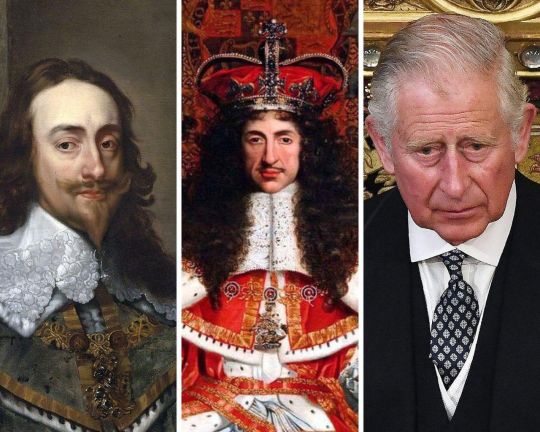
You can make all sorts of solid arguments against a constitutional monarchy - but the point of monarchy is precisely that it is not the fruit of an argument. It is emphatically not an Enlightenment institution. It’s a primordial institution smuggled into a democratic system. It has nothing to do with merit and logic and everything to do with authority and mystery - two deeply human needs our modern world has trouble satisfying without danger.
- Andrew Sullivan
This is the genius of the British monarchy, supremacy exemplified in Elizabeth II and King Charles III. Walter Bagehot was the first to really get to the heart of the matter.
Walter Bagehot, a journalist who would co-found and edit The Economist magazine was one of the greatest Victorians of the 19th Century and he concerned himself with the workings and the reform of the delicate constitutional arrangements between parliament, the House of Lords, and the monarchy as so much is based on custom and unwritten practice.
Walter Bagehot published his classic work, The English Constitution in 1867 but it is the best way to understand the delicate balance of parliament and the monarchy. No one has written a finer work than Bagehot and his book remains the bible for many interested in constitutional matters regarding the monarchy.
In it he argued that the constitution was divided into two branches. The monarchy represents the “dignified” branch. Its job is to symbolise the nation through pomp and ceremony. The government - Parliament, the cabinet and the civil service - represents the “efficient” branch. Its job is to run the country by passing laws and providing public services. He was right to say that the dignified branch governs through poetry, and the efficient branch through prose.
In Bagehot’s view, a politically-inactive monarchy served the best interests of the United Kingdom; by abstaining from direct rule, the monarch levitated above the political fray of tribal politics (of left and right), and remained a respected personage to whom all subjects could look to as a guiding light. The monarch was to stay severely neutral and be apolitical. Instead the monarch was to embody in the flesh the core values of a nation.
There is a tremendous burden tied to that kind of role. When Elizabeth Windsor became queen, she was tasked as a twenty-something with a job that required her to say or do nothing that could be misconstrued, controversial, or even interestingly human - for the rest of her life. King Charles III has taken on that mantle now.
Duty, sacrificial service, and honour....without power. That’s the role of modern royalty.
It’s hard for non-British people to understand how she came to embody the pysche of the nation. The Crown represents something from the ancient past, a logically indefensible but emotionally salient symbol of something called a nation, something that gives its members meaning and happiness. As Bagehot says, it’s an act of imagination.
Some of my non-British friends particularly can’t quite grasp this connection; to them the British royal family functions mainly at best as a different form of celebrity. But to these friends as well as those sincerely opposed to monarchy can and should grasp something else - nations and cultures need people and institutions who transcend politics, which in itself quickly descends into tribalism or worse, authoritarianism.
#sullivan#andrew sullivan#monarchy#quote#britain#republicanisl#bagehot#walter bagehot#constitutional monarchy#elizabeth II#society#culture#tradition#custom#queen elizabeth II#king charles III#charles III#history#british history
114 notes
·
View notes
Text
Oh! My Sunshine Night
Binge watch.
Okay so I am hopped up on cold meds and jet lagged and I decided to try to watch this soapy mess because why tf not?
Ep 1
Oh no, it’s good. Like: this is a good opening. And I do love OhmFluke, but you know who I really love? Noh (orig. Nitiman). Gah.

For the first time in a long while two boys in a BL make for actually believable brothers. Whacha know?
Fluke’s hair is AWFUL.
And suddenly the whole thing goes v odd. I’m not sure if that’s the captions, or if the show itself is trying to be existential. What an odd meet cute and what strange dialogue.
I’m so confused.
It’s like it’s trying to be both BL and transcendental poetry.
I like spunky Fluke tho.
Linguistic corner: these two are using chan/nai for I/you - v formal.
Poor Noh, they always make him play sports when it’s clear he just... doesn’t.
How much do I love the whipping boy side couple?
SO MUCH!!!!

Ep 2
Is the thing with the apples just to make Fluke cry?
I like the conflicted poor little rich kids family dynamic.
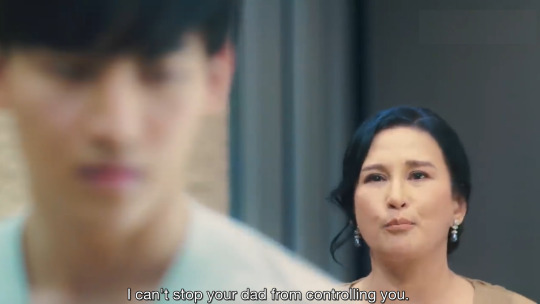
But there’s a lot of establishing scenes, it’s moving pretty slowly.
Sorry this one isn’t whipping me into a verbal frenzy. I’d drink, but not on top of cold meds. You know those warnings on med labels? They’re for me. I’m the one that shouldn’t operate machinery, not even a computer.
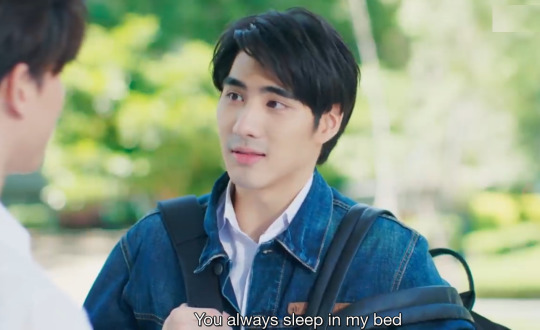
Wait. What? Why didn’t we get to SEE this bit?
Ep 3
So this is about classical music and no one is actually playing and no one is singing, so I’m absolutely fine with it.
The fencers with the unrequited crushes are boring to me. But there is a kind of Midsummer Night’s Dream aspect to these relationship dynamics.
GAH! The apple collecting thing was so cute and so romantic.
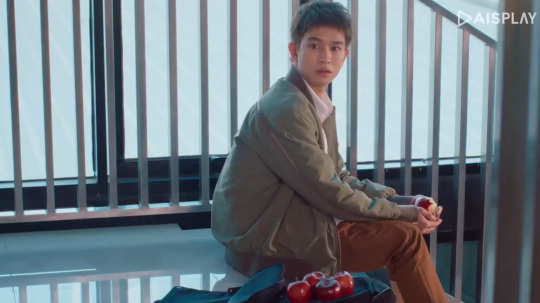
Not a lot of BL tropes so far in this show, but I like it’s brand of sappy.
I love how utterly incapable of flirting Kim is.
The opening the car door thing did, in fact, make me hoot with laughter.

Fluke’s pretty darn good at being a bossy bitch and Ohm does exasperation well. Honestly, I’m liking this show a lot more than I thought I would.
Oh yay! We get to see Rain sleeping in his boys room. Lovely. I do enjoy whipping boy trope, v kinky.

*sits back and smiles in dominant smug*
I ALSO love the little brat in-crush with Rugby Rain. It’s all very delish.
It’s thanksgiving all over again, I’m all about the side dishes.
Okay, the end of this episode was so confusing. Are they play acting a couple break up for the girl? Are they actually arguing? What are they arguing about? Were they dating? What happened? What’d I miss? Why the dramatic soap opera music? Why the overacting?
What is going on?
Ep 4
Oh I forgot about the fencers.
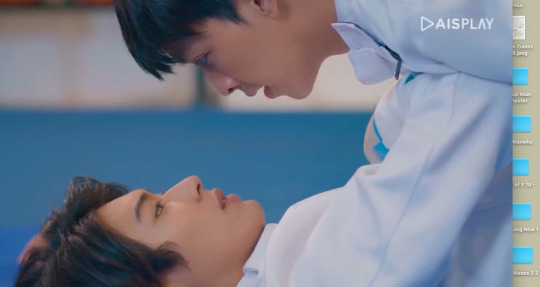
And finally a BL trope, crash into me. (At least it wasn’t a pratfall kiss.)
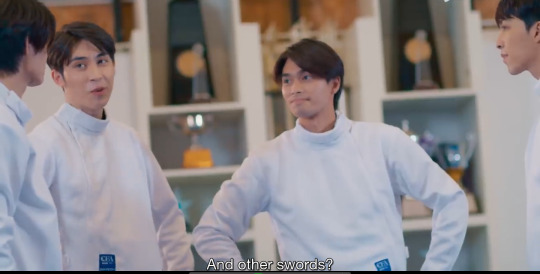
Oh I do like a gay fencer sword pun.
Very nice.
Also, a shower scene already? Are these two the PokeTongue’s of this show?
Who let Star Hunter in the house?

Rain + Sun and the insults was great. Very funny. These two are kinda of alike, actually. Fun fun. I like these characters.
Bounce bounce.
Why didn’t anyone tell me this was such a goofy show?
I’m getting a tiny bleed of Japanese slapstick absurdist leaking in and I’m not mad about it. The weird apples and arbitrary mood swings should have tipped me off.
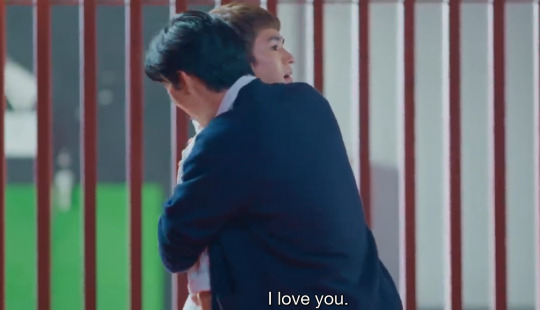
This show has almost a panto play going on.
Rain IDing his brother’s bf and being like, welcome to the fam, I leave him in you care was such a Dom move.
Oh, baby is a floppy drunk! Finally some BL tropes are dropping. And another crash into me. And a wet towel sponge bath. Tropes coming thick & fast now (speaking of thick & fast.... wait, no, bad cold meds, don’t go there)...
Okay, we are back in familiar territory. I thought this one was going to be original. Silly me! This is BL!
Not sure if I am disappointed or not.

Ep 5
Bathroom drama.
Fencing sword boys drama. Why so mean? Honestly, if I were Kim I’d be out too.
Ooo Rain with the consent, even if it’s just a hook up. Also... boys. Bunk beds? Everyone is gonna know. Like EVERYONE.
This show is going places I really did not expect.
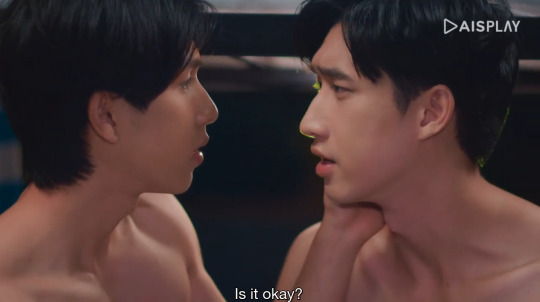
Oh! It was all a fake out. *pout*
Okay baby boy, you get down with those fantasies. I’m with you. He hot.
What’s with Sun and the magical Ikea box?
Also, they’ve know each other since childhood trope? Really?
*whines” I don’t want to add another one to that trope list.
Ep 6
I like the plot of butler dad kinda finding out his son is involved with the heir. Good dramatic twisting. Also, evil homophobic jerk nozzle, turns out.
I remain engaged.

Did the stretching part make me grin?
Yes t did. Boys rolling around on mats together never fails to please.
There are a lot of faen fatals and fatales. Like this show is lousy with them. I see why everyone called it a soap opera.
I am so happy that there is no singing I don’t even mind that no one can play an instrument in that whole band (orchestra).
Honestly, the band leader (conductor) looks like First’s (of JaFirst) older brother. It’s wigging me out.
Ep 7
Look, I admit, I am not even half way through and I am flagging a bit. This is a long arse show.
Speaking of arses...
Another shower scene?
(Anyone else notice that it’s always the same shower? No? Just me. Can’t be helped. Unforgotten Night has made me overly concerned with Thai pluming in BL ... not a euphemism.)
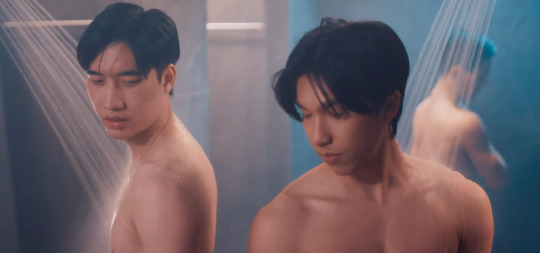
Boy this series has a supper voyeuristic lens. Not that I’m complaining, never that.
(Bops over to see if the director is gay.... MDL = no info on subject. Well, okay then.)
Returns to shower scene, arses, pluming, and supposition.
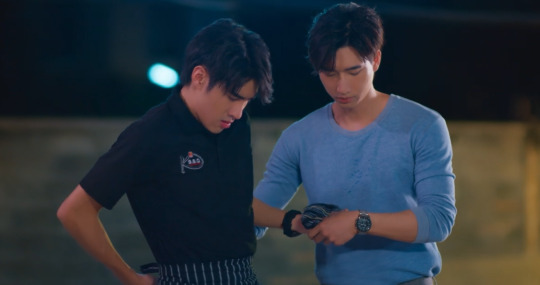
Oh! Wound tending!
Ooo, rejected fencing cutie makes move on Sun! Kim is not pleased. you snooze you loose, big boy.
Coils within coils, this is such a soap. I love it. Did I mention I was raised on bread, water & East Enders?
Okay maybe not raised.
Definitely watched too much of it tho.
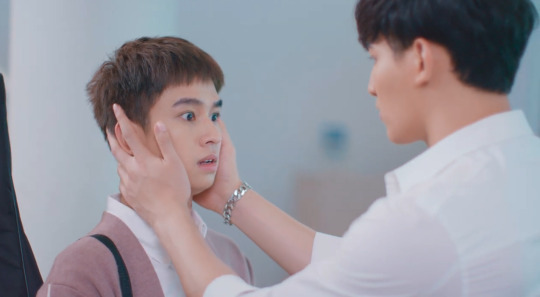
Oooo, that was a very Light On Me moment.
PAUSE TO REFUEL
Okay I have consumed Korean soft tofu stew and more loopy-making cold meds, and will work on a pomegranate while I continue to watch.
Ep 8
Mostly worked on the pomegranate.
Meds took effect.
Stuff happened int he show but I forgot to make notes. Pomegranate distraction.
Oddly, I’m missing the swordsmen.
Ep 9
Oh, hair drying. Cute. I kinda have come around to this trope over the years I’ve had it shoved in my face... erm... flopped on my head.
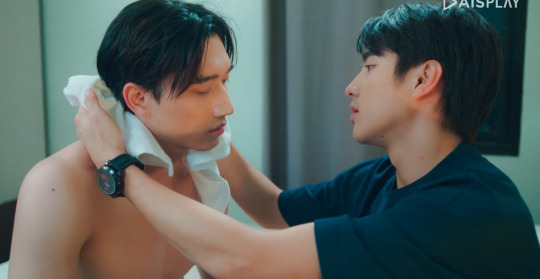
MORE SHOWER
Oh! My Showering Night more like it.
I declare this BL official winner of this trope.
Meanwhile beach frolic. AND a woods frolic.
Ep 10
Finally I’m half way through!
Oooo we have a magic heart rebooting BOOP! to go with the magic apples.

Oooo more shower scene, this time with added bonus sexitimes. Also neck kisses! My favorite.
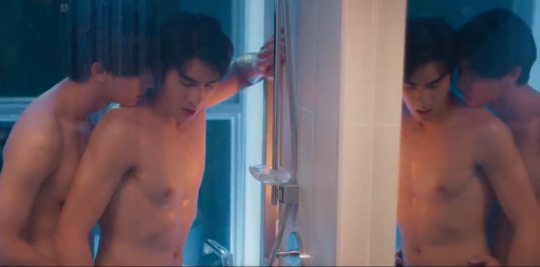
I’m sorry but I just keep imagining what if we had gotten to this level with Nitman?
Oh, what could have been.
Nice kisses! But also no sex on the beach boys, no one enjoys that.

Meanwhile, the fencers can’t figure their shit out, because they keep fighting with the wrong swords.
And our main couple is being quite tame with a shoulder lean, side hug, water watching triple trope strike on the beach.

Okay weird dream helicopter thing.
Look, Mean Rich Paw, I’d kick him out of the house for wearing that outfit alone.
No other reasons needed.
Disown the fucker.
Band shirt/vest/thingy, no inheritance for you!
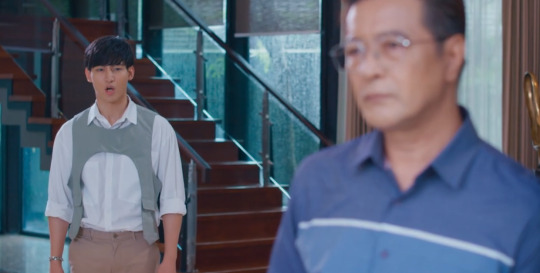
Man the fashion this year in BL has been brutal.
Ep 11
I don’t know If I can finish this tonight.
Invited up to the Sun’s room is he? (occasional flashes of DeanPharm).
Okay, wait, the premise of Sun’s illness is SO STRANGE. He has to eat apples and stay away from his parents to save his heart?
What the hell is going on?
The whipping boy always has to run, identity separation is part of the trope. Because his identity is too tied to the spoiled prince, he has to try to make it on his own to realize he can’t.
I like the twist of butler dad encouraging him to leave, tho. (Usually whipping boy is abandoned or an orphan.)
Ep 12
OMG who eats shrimp when they are allergic to shellfish? for fuck’s sake.
Another white towel sponge bath? I take back what I said about lack of tropes.
I do love the tug and cuddle my human bolster pillow. It’s very sleepy entitled.
I am v bored by the parents buying the estate plot-line. I can’t decide if doctor lady is running a con or father and son are running a reverse con on her?
OOOO DRAMA!!!
The parents have died! Rain is missing! The doctor lady is indeed evil! Ohm has to act!
Oh fuck me not the amnesia trope.
I HATE THAT TROPE.
Okay, I gotta go to bed. I really tried. Had this been a normal length Thai BL I would have made it. But the rise of the amnesia trope did me in.
Tomorrow~
Ep 13
I am glad Dad Butler is evil enough to recognize Dr. lady is also Evil. And we have a textbook soap opera definition hostile takeover. The evils go up against each other.
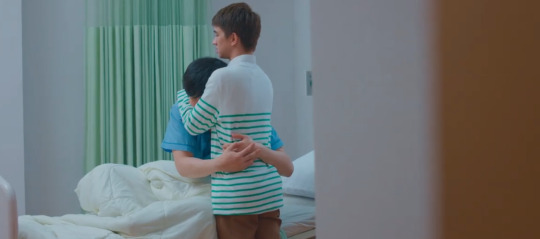
We are in true Heirs level soap opera territory now.
Someone is definitely going to be kidnapped soon.
Ep 14
This is my surprised face, the man allergic to shellfish, who still eats shrimp, goes wandering off into the forest with no survival skills when he has a brain injury.
Fantastic.
A time-lapse 3 months.
Finally, the attack of the amnesia trope!
I am so unhappy about this.
Ep 15
We are moving into Bold & Beautiful level soap.
The guys in the woods are still looking for Rain, still wearing exactly the same clothes that they’ve been wearing for 3 months.
Apple boy, still eating apples and still talking to completely whacked out mother. I hate her. While Kim turns into a forgetful depressed rich recluse in the mountains. Now I understand why people got frustrated with this show.
I feel like I read this as a really bad 70s romance novel, or maybe it’s meant to be like a Jane Eyre remake?
Anyway, finally, our boys are reunited, but of course, amnesia trope. We hates it precious. All the friends have arrived. Or to be more precise all the incestuous faen fatals have arrived.
Ep 16
After 3 months, one would have hoped the fencing boys had figured out their shit. I guess not. More evil fashion.
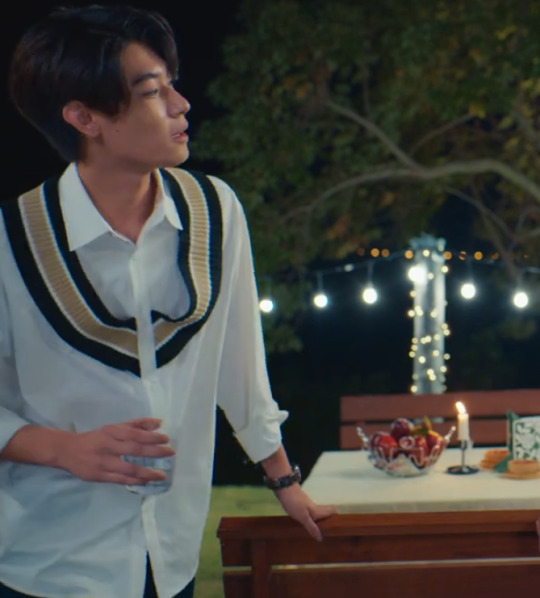
I just can’t even. At least they took it off him fast. Wish it had gotten ripped in the process.
Fencing boys now figuring everything out in the best way possible.
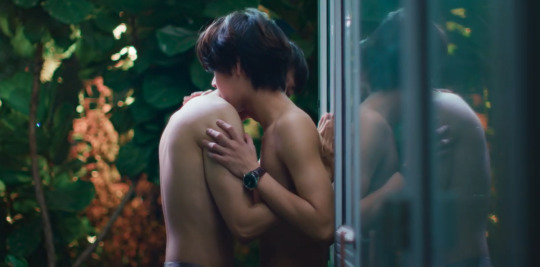
This show keep surprising me with how high heat it is.
Ep 17
Magical, candy-colored comets. I just can’t with this show. Also… new crumbs.
The refractory period on these rebound couples is as fast as the show is slow. Some weird monogamy mathematical principle must be in play.
And it’s finally revealed that they are childhood sweethearts.
OhmFluke do give good kiss. Fluke dose submission v well.
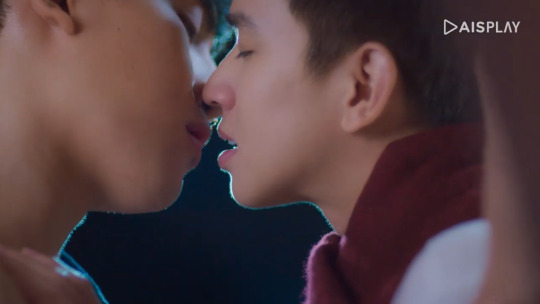
In fact * waves hands airily about* good kisses all around. Well done cast!
Also, and I am only admitting this to you people, but I totally have a fetish for CMNM and we NEVER get to see it, so thank you for this one, OMSN.
Ep 18
Good sex, bad plot.
That’s my ultimate review of this show. (Which makes this kinda a runner up to KP to be honest)
Look, I get that BL has rules that must be obeyed:
boys must damsel off into the woods alone.
boys must talk to their not-quite boyfriend while said bf is asleep, but he is never actually asleep.
not one drop of rain is ever allowed to touch your boyfriend’s head because DOOM AWAITS
Clear? OK. No I don’t understand why these rules exist either. I don’t make them, the BL gods do.
Anyway OMSN is all over rule #1.
Anyway, back to this damn show. Attempted kidnapping, and Kim has to save his boyfriend with a bow & arrow plus some arbitrary somersaulting in, what is this now? The Hunger Games BL?
*ooo, wait a moment - KOREA make that happen! - where was i?*
WILL SOMEBODY PLEASE TELL ME WHAT THE HELL IS GOING ON?
THIS SHOW IS TOTALLY ON CRACK IN A WAY THAT, FRANKLY, EVEN YYY COULDN’T EMULATE.
Look, my dumb new dictation software made that into all caps and I’m leaving it because it’s entirely appropriate.
Meanwhile, you can not do a close-up of a gun if it doesn’t have a trigger. I understand there are weird regulations in place but just do a further away shot OK?

Oh look, it’s ABL’s Angels.
Want to start a detective agency, pretty boys? I’ll be your voice in the box. You can have all the shower scenes you want. We could invite MaxTul? I’m sure they’d be game. (Frankly Manner of Death had a more cohesive plot than this.)
We basically end on a pastiche of troops that the show didn’t manage to hit earlier: boys on bridges, a forehead kiss, back hugs, put a robe on him, and...

How do I sum this up?
I am left with mostly a profound feeling of confusion. Where did Dad Butler go? And yet I am also curiously satisfied. I mean, all the sex scenes were good. I don’t know how to rate this. Less annoying than LITA, not as boring as it could’ve been? Except that I was really quick on the fast forward button and skipped a ton of establishing shots. This was probably agony to get through if you watched it week-by-week, but it’s OK as a high-speed binge.
What the hell?
7/10
Quick Pitch:
Kim, a tsundere musician meets Sun, a sunshine transfer student with a weak heart. Also there’s a hot older brother + their household servant, and a couple of fencers for good measure. Initially this pretends to be a normal university BL, then it slips on wet tiles and falls right on trough multiple shower scenes into ludicrous soap opera territory leaving one with a sensation rather like trying to hold onto soap in a communal shower. Ultimately, everyone seems pretty happy they bent over, but no one actually got clean.
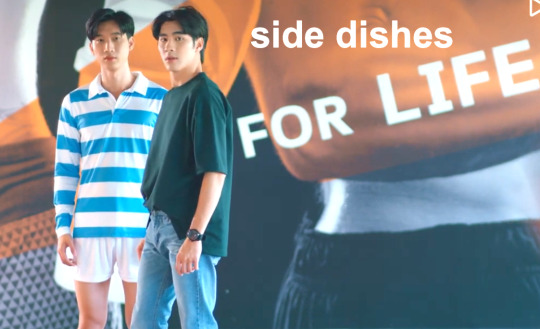
Or should I say soap dishes?
(source)
#oh my sunshine night#thai bl#watch along#ohm thitiwat#ohmfluke#noh phouluang#nitiman#no singing!#sword puns#honor the crumbs#gay fencers#PokeTongue#Star Hunter Studio#East Enders#Such a soap opera#Nitman#DeanPharm#KimSun
111 notes
·
View notes